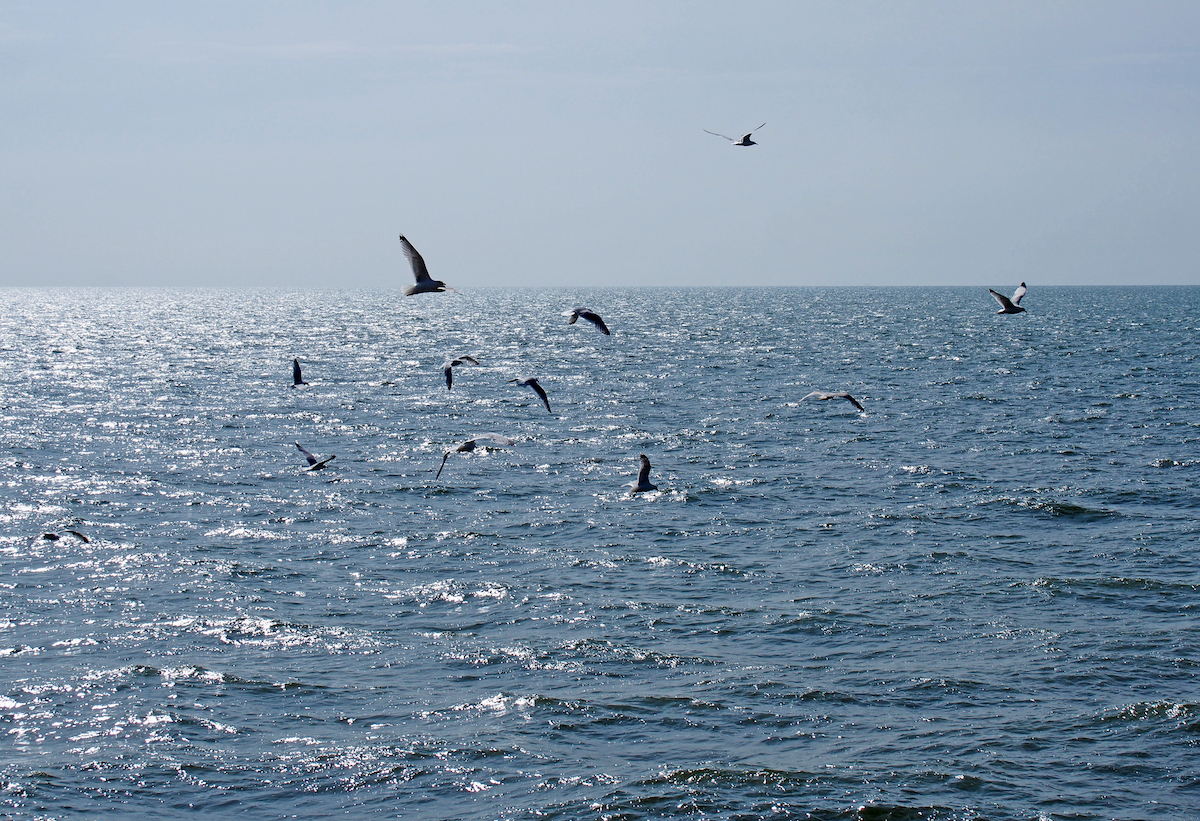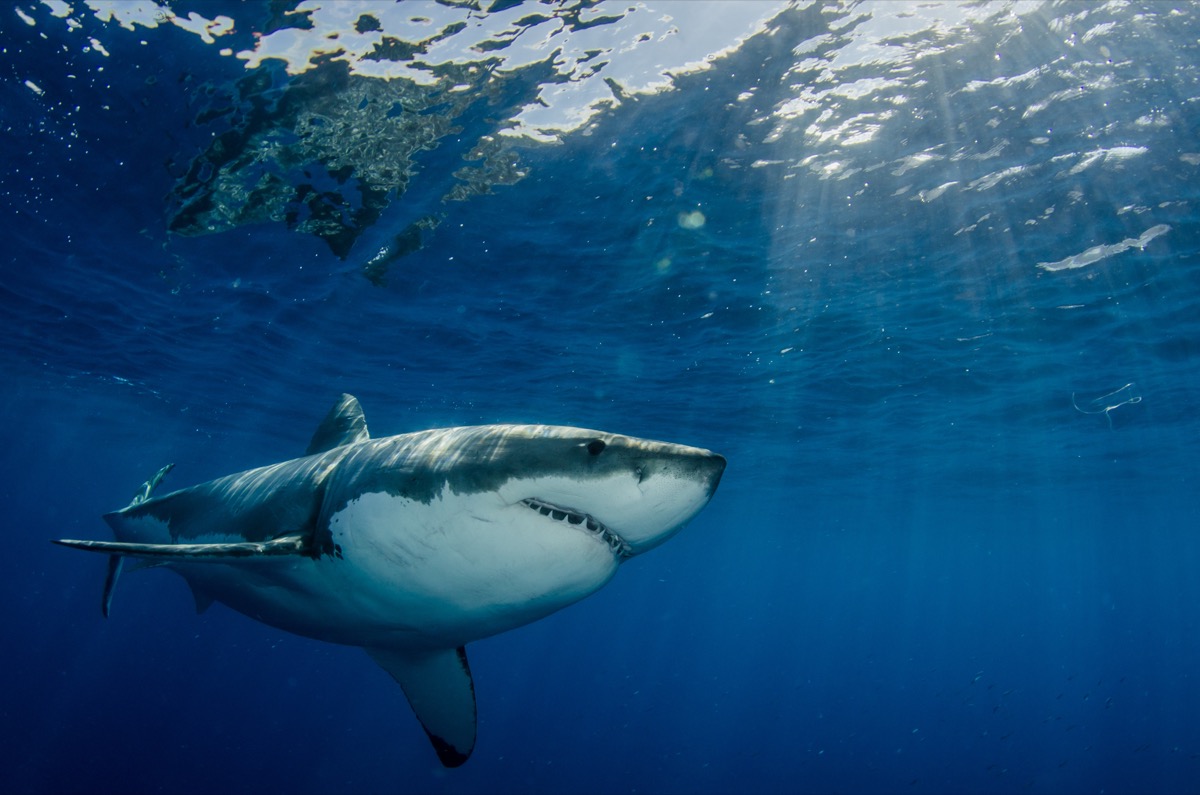If You See This in the Ocean, Don’t Go In, Shark Experts Warn

Now that most COVID restrictions have been lifted in the U.S. and temperatures are rising to, in some cases, record-breaking heights, more and more people are looking to enjoy some time at the beach. But even if you’re no longer concerned about the coronavirus the next time you head to the beach, that doesn’t mean you should throw all caution to the wind. The ocean can still pose some seasonal risks, and experts warn that seeing a few subtle red flags in particular in the water means you should not go in at all, because sharks could be nearby. Read on to find out what to keep your eye out for during your next beach trip.
RELATED: If You Live in These States, Never Go in the Ocean When It’s Calm.
If you see birds diving or fish jumping, don’t go in the ocean.

Chuck Bangley, PhD, a marine biologist and researcher at Dalhousie University, told Eyewitness News 11 in North Carolina that the main thing you should look for before going in the ocean is any animals that sharks like to feast on. “Some of the best advice that I can give is just be aware of your surroundings,” Bangley said. “Sharks are generally really good at what they do. They’re capable of identifying things that are and are not on the menu.”
The good news is, you’re likely not on the menu. According to the University of Florida’s International Shark Attack Files (ISAF), in 2020, there were 57 instances of unprovoked shark bites on humans and 39 provoked bites worldwide, proving getting bitten by a shark is a rare event.
But if you’re scared of what could be lurking in the ocean, Bangley says to keep an eye on birds and fish. “If you see birds diving or fish jumping, that could be an indicator that a larger predator, perhaps a shark, could be attempting to prey upon a school of fish,” Eyewitness News says. In short, the best way to avoid a bite from a shark is to “stay out of the food chain,” as Forbes explains.
Bangley also says to avoid swimming or surfing near fishing areas and piers, as the smell of bait or a struggling fish can attract sharks.
RELATED: Never Go in a Lake If You See This One Thing, Local Officials Warn.
And if you see seals in the ocean, you also shouldn’t go in.

A group of seals in the ocean may look harmless and even cute, but the reality is far from it. Not only can seals themselves be dangerous, but they’re another one of sharks’ favorite snacks. Greg Skomal, a Marine Fisheries biologist and shark researcher, told the Boston Herald that sharks hunt seals in shallow parts of the ocean as long as there is at least five to six feet of water.
And sharks can mistake humans for seals—especially if you’re already near a group of them. “If you’re foolish enough to go swimming among a group of seals frolicking in the shallows, then you’re putting yourself at risk. There’s no question about that,” Bob Hueter, chief scientist at OCEARCH, an organization that collects and tracks shark data, told Forbes.
Experts say great white shark sightings have increased recently in the U.S.

According to experts, shark sightings, especially great whites, are on the rise in the U.S. right now. “This is summertime, and this is when people get bitten,” Hueter warned. “The first thing to remember is that the ocean is a wild place.”
Though they’re hitting both the east and west coasts lately, great white sharks are more prevalent in some areas than others. A 1,400 pound great white shark was tracked along the Jersey Shore recently, and a California surfer had to be hospitalized after being bitten by a great white shark off the San Francisco Bay Area coast. OCEARCH is currently tracking 70 sharks in real-time, and the organization reports that, in addition to those states, several great white sharks have been tagged off the coasts of South Carolina, North Carolina, Virginia, New York, Massachusetts, and Maine.
RELATED: And for more summer safety advice, sign up for our daily newsletter.
Up to half of all shark attacks can be attributed to great white sharks.

According to National Geographic, great white sharks usually cause a third to half of all shark attacks reported worldwide every year. The University of Florida’s ISAF found that great white sharks were involved in at least 16 unprovoked shark bites in 2020, including six of the year’s 10 fatalities. In the U.S., one swimmer was killed by a great white shark in California and another was killed by the species in Maine last year.
“I think the frequency of white sharks swimming in the same places as humans may be on the rise, but if so, we don’t yet know the cause,” Gavin Naylor, director of the Florida Museum of Natural History’s shark research program, said in a statement.
But ultimately, Hueter says that there are bigger concerns for beachgoers. “Recognize that you face much greater risks when you go swimming in the ocean from things like undertows and rip currents and lightning, which kill more people than sharks ever do,” he told Forbes. And the numbers back that up. According to statistics from the ISAF, beachgoers are more than 100 times more likely to drown in the ocean than get bitten by a shark, per Forbes.
RELATED: If You See This, Get Out of the Pool Immediately, Experts Warn.